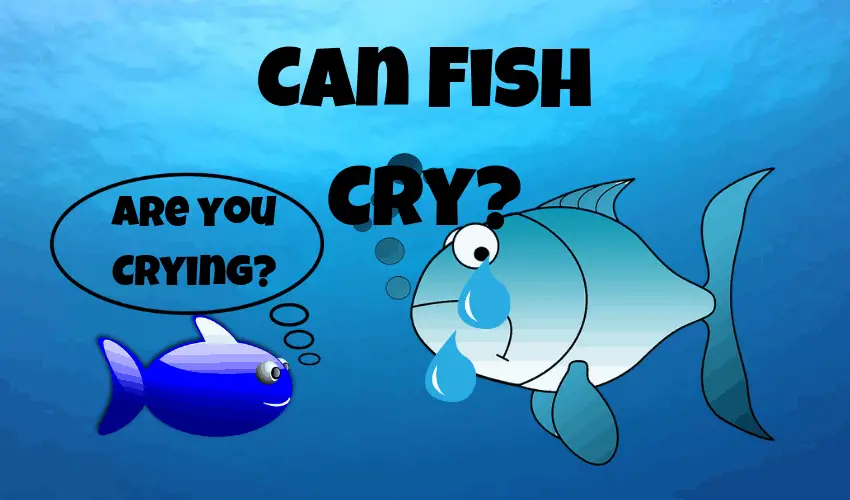This seems a strange question to ask, but one that is asked on a regular basis and therefore warrants an answer.
Why do people and possibly some animals cry? Do they cry for emotional reasons or is it simply a bodily function to serve a purpose?
Let’s have a look and see if fish cry and if they do, why?
Can fish cry? The cerebral cortex is neurologically, what allows us to produce tears, and this is unique to mammals alone. This means that, no, fish cannot cry. They lack both the mental complexity and the emotional depth. Along with this, fish’s eyes are saturated in a watery medium, which makes tears unrealistic for them physiologically. Tears are a means of lubrication for the eyes; one that for fish, is unnecessary.
Table of Contents
The Cerebral Cortex Allows Mammals to Cry
As aforementioned, the cerebral cortex is what allows mammals to cry. It is a part of our nervous system, which fish simply do not have. Specifically, the cerebral cortex gives us the capacity to reflect on the past, and imagine the future, along with many other complex cognitive abilities. Indeed, the ability to cry seems to be both a blessing, and a curse. Tears are a sign of superior intelligence, but also neuroticism and sentimental vulnerability. When it comes down to it, however, the ability to cry is a hallmark of evolution.
Fish Cannot Cry, But Some Fish Can Make Crying Noises
While the Three-Spined Toadfish is no more capable of tears than its aquatic counterparts, these fish can make noises which sound much like crying. Most of the time this is to attract the attention of mates, but they have been known to utter it when in distress as well. This is when it could be considered a sort of crying, though it is doubtlessly a cry of fear rather than sorrow.
The Three-Spined Toadfish is the only known fish to vocalize and communicate this way. Hence, the fish is easily recognized by its call, as well as its distinct appearance: rock-like – to the extent where it may be mistaken as a stone.
Dolphins Are Aquatic and Therefore Do Not Cry, Despite Being Mammals
For protection from seawater, dolphins, whales and seals all produce a watery mucus in their eyes. This is similar to how fish’s eyes are constantly saturated in a watery medium. None of these creatures are truly able to cry. Like the Three-Spined Toadfish, dolphins, whales and seals can vocalize when in distress, and this is the closest they are known to come to crying.
That being said, mammals such as dolphins, whales and seals do possess a cerebral cortex. In fact dolphins in particular, have quite a large cerebral cortex. The cerebral cortex of dolphins has been said to be roughly 40% larger than that of humans. In theory, this means that dolphins, at least, possess the capacity for sorrow, and may even mourn. Perhaps, were they not underwater, dolphins would possess the ability to cry. Certainly, tears would not seem out-of-place for these expressive creatures.
The calls of whales seem emotive enough for tears also. But as a general rule, underwater creatures do not cry. As their eyes are already perpetually wet, tears are simply unnecessary, both for fish and underwater mammals.
Fish Cannot Cry, but Fish Can Feel Unhappy
Fish may not be able to cry, but they are still capable of some very basic emotions. For example, fish can feel happiness at feeding time and when playing with other fish etc. They can also feel unhappiness and depression. Fish are simple creatures, with needs that are simple.
As simple as these needs may be, they are important, and if they are not met, a fish will be prone to an overall negative state, both physically and emotionally; which is particularly true for pet fish. This is because their environment is dependent on their owner, and this leaves room for error. Improper conditions, feeding and the like will all too easily lead to unhappiness in fish. So, while fish may not be able to cry, their requirements, and yes, even feelings, must still be taken into consideration, to some degree, in order for them to be happy.
Following are some common mistakes that fish owners make, which can make their fish unhappy.
A Small Tank Makes for A Sad Fish
One of the things that is sure to take the spirit out of your fish is a small tank. After all, if there is no room to swim around, why bother to try?
A small tank is a recipe for depression and even a decreased lifespan in fish of all kinds. The smallest tank that should be considered is a 10 gallons aquarium. A 20-30 gallon tank is ideal, for your average 5-fish school of 3 inch fish. For larger fish varieties, and/or larger communities, do your research, and expand the tank accordingly.
A fish bowl should never be a serious choice. Not only is this guaranteed to leave your fish unable to swim about sufficiently, there is no room in a fish bowl for the other necessary components of a tank.
Hungry Fish are Not Happy Fish
Hunger is another common cause of unhappiness in fish. You see, some fish are faster eaters than others, and therefore will finish the food before others have had their fill. Just one time of this happening will leave a fish dissatisfied and hungry. If a fish misses food consistently, it becomes prey to malnutrition and the myriad of health issues that can occur as a consequence.
In order to ensure that all fish are well-fed, it’s best to pair fish which eat at similar speeds, or fish which eat at different levels of the tank, so that they have their own space. Of course, one must not overfeed fish either; this will lead to leftover detritus and an overall decrease in tank quality.
We recommended that you feed your fish in the quantity and frequency as shown on the fish food container (normally only a couple pinches or so and 3 to 4 times per day), and to leave the food for no more than 5 minutes. Clean up swiftly, to help maintain a clean tank.
A Peaceful Fish Community is the Key to Happy Fish
In order to create a fish community that is peaceful, it is important to put appropriate thought into which fish will go into the tank. There are certain types of fish which get along better than others. Bamboo Shrimp and Vampire Shrimp, for example, are known to graze together companionably. As a rule, avoid fin-nippers, like Barbs and Cichlids. These can all-too-easily injure fellow fish with their bites.
It is also imperative to ensure that your tank is not overcrowded, and that there are not too many males (even male fish not known for their aggression can become competitive and territorial). Plenty of hiding spaces such as caves and plants, must be provided to allow fish their privacy when they desire. Separate mating fish so as to reduce their stress and of course to protect any resulting spawn. Fish do not need a lot, and if you meet these basic needs, they will be content with life.
This article is part of a series of article entitled: Do Fish……
- Do fish fart?
- Do fish die if they stop swimming?
- Do fish ever get tired of swimming?
- Do fish have good eyesight?
Conclusion: Do fish cry?
In summation, fish do not possess the intricate nervous system to cry, nor the cerebral cortex which is required for contemplation and deep emotions. Fish have no need for tears either, as their eyes are always naturally wet.
They can still experience unhappiness, if they are kept improperly in captivity. Luckily it is easy enough to give fish what they require, and they will reward you with health, which will enhance their beauty (the proper vitamins make fish shine) and personality, and make them very happy, so they have no need for tears.
[author title=”About the Author”]

I have been working in the tropical fish industry for over 30 years now and I’m still learning. Everyday is a school day in this hobby. In my spare time I play golf very badly!


